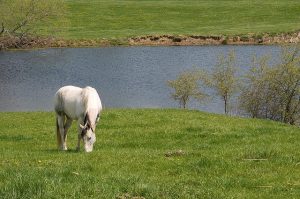Obesity in horses can be the result of increased consumption of palatable food, lack of stimulation and of course, just like us, decreased exercise or eating in place of other activities. Even though an obese horse needs less food, you do not want to abruptly  remove food from them. Food amounts should be decreased on a gradual basis, while increasing exercise. Take some time to evaluate the nutrient content of the food and make any adjustments for a more balanced ration that will help your horse lose weight.
remove food from them. Food amounts should be decreased on a gradual basis, while increasing exercise. Take some time to evaluate the nutrient content of the food and make any adjustments for a more balanced ration that will help your horse lose weight.
Horse owners should watch for signs of anxiety in their horse, whether it is pacing or vocalization when their housing conditions or stable mates change. Circling or stall walking is usually a response to separation from another horse and is often fast-paced. Treatment should include social company, increased exercise, clean bedding and allowing the horse to see other horses. Provide a more open stall, if possible, with better access to outside views, and feed more frequently. Toys for the stall can help, especially if the horse is young and active.
When a horse that normally stall walks is then tied or prevented from walking due to a restricted space, they can do what is called ‘weaving.’ They cannot circle or walk around as usual and will move in a weaving motion. Provide a larger stall, untie the horse so they can walk or turn the horse out to pasture to remedy this issue.
When horses are confined and fed highly palatable food, they can start pawing the ground. This will not only damage the floor, it can damage a horse’s hoof. Horses will also do this in the pasture during the winter months when they have to dig for feed. In order to successfully treat this situation, the underlying cause needs to be determined. Similar treatments used in stall walking work; however keep in mind that you should not reward this behavior with food. Horses inadvertently paw the ground in anticipation of being fed. If this continues, bring the horse to the feed or give them the food when they stop pawing.
When a horse kicks a stall, it sounds like the walls are going to come down or a gun went off. Kicking damages horses’ legs as well as the stall. It is an aggressive behavior that occurs when another horse is near or the horse perceives that another horse is nearby. It can also occur in anticipation of being fed, or if the horse cannot do what it wants to do that moment, like exercising or mating. Whatever the cause, it needs to be determined in order to figure out the best course of action. It may require rearranging the social grouping in the barn or utilizing the same solutions for stall walking.
Cribbing is another frustrating situation and is different from wood chewing. It involves the horse grasping a horizontal surface with their front teeth, flexing the neck without swallowing air. It produces a strange sound and is easily diagnosed when you see missing u-shaped pieces from the fencing. Worn-down teeth and thick neck muscles are signs that your horse is cribbing. Treatment includes adding more roughage to their diet, providing greater access to the pasture or changing companions in the barn.
Photo: Courtesy of A. Blight via Flickr (CC by 2.0)









